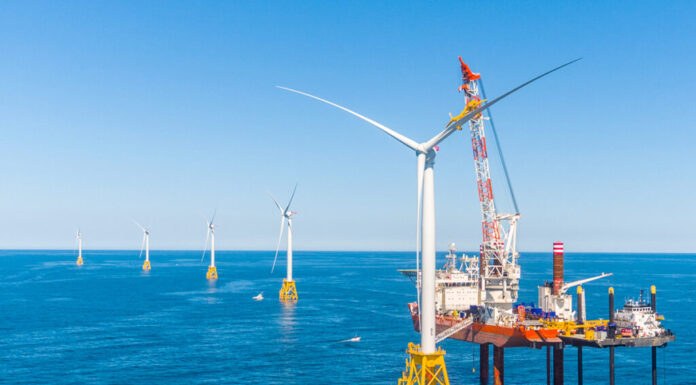
PROVIDENCE – Rhode Island leaders insist the state’s ambitious renewable-energy goals and related projects won’t be affected by recently announced delays in what was slated to be the country’s first major offshore wind farm.
Vineyard Wind LLC on Dec. 1 announced it would be pulling previously submitted construction and operating plans from federal review after signing an agreement with General Electric Co. to design and build what will now be a 63-turbine project off the coast of Martha’s Vineyard. The project, which has been plagued by delays, was slated to receive the requisite environmental review from the U.S. Department of Interior’s Bureau of Ocean Energy Management this month, with a final decision in January.
In a statement, Vineyard Wind said its internal review of construction and operation plans would take several weeks, and the company still expected to start construction in 2021 with the project generating power by 2023. While the projected 800 megawatts of power will benefit Massachusetts, not Rhode Island, local industry leaders have largely viewed the timeline and outcome of Vineyard Wind as a direct indicator of when and if other offshore wind projects will move forward. This includes international developer Orsted A/S’s Revolution Wind project slated to be constructed off Block Island, as well as the state’s recently announced plans to solicit proposals for another major offshore wind farm.
Orsted declined to comment on the latest delays in Vineyard Wind, reiterating a previous statement that it expects the initial 2023 completion date for Revolution Wind will be pushed back, but cannot adapt a new construction schedule until they receive more guidance from BOEM.
However, agreements between National Grid Rhode Island and the developer outline a series of deadlines for project benchmarks based on this original completion date, starting with receipt of all project permits by May 1, 2022 and ending with a commercial operation date in January 2024. The agreement allows the parties to extend certain deadlines, but not the commercial operation date or project financing unless the developer posts an additional $2 million deposit for each six-month extension. Alternatively, a “force majeure” event in which unforeseen circumstances prevent the developer from meeting the agreed-upon benchmarks can bring about a 24-month extension.
Spokespeople for Orsted and National Grid said it was too early to consider agreeing upon deadline extensions or whether federal permitting delays merited appropriate use of the force majeure clause.
R.I Energy Commissioner Nicholas Ucci also said in a statement that the state “has no indication, from the developer or the utility, that the existing contract is at risk, nor would we expect that to be the case.”
He added that it is common, given the complexity of large-scale renewable projects, for agreements to contain caveats that allow for extensions on “critical milestones.”
The state already includes the 400 megawatts of power expected from the Revolution Wind project in its current calculation for renewable power statewide – 933 megawatts as of the third quarter of 2020, according to the R.I. Office of Energy Resources. The project’s contribution to current power generation would only be removed if the contract between National Grid and the developer ended, Ucci said.
A BOEM spokesman declined to comment on how Vineyard Wind’s decision to pull construction and operating permits would affect the final ruling on the project, or others in the pipeline behind it, referring to the project webpage for future timeline updates.











